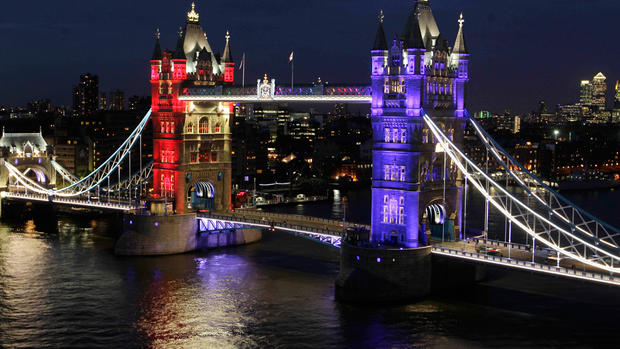Unprecedented security for Queen's Diamond Jubilee
(CBS News) LONDON - Millions of people will come out to celebrate Queen Elizabeth II's Diamond Jubilee during a four-day holiday weekend, and unprecedented security measures will be in place.
They've been in the works for months now.
Some will be on very obvious display all weekend long, and others won't be seen by the public at all.
It will be the biggest royal security operation in history.
"This will be bigger than the royal wedding in terms of the length of time it's going on for - it's a whole weekend, four days, in fact, of celebrations," says CBS News consultant Peter Clarke, a former head of counter-terrorism for Scotland Yard.
That's like having four royal weddings like last year's, back-to-back.
Over the past month, police and sniffer dogs have been scouring every inch of central London, searching for explosives.
The center attraction is a potential security nightmare: Sunday's Diamond Jubilee pageant.
One thousand boats, with tens of thousands of people on board, will follow the Queen and every other senior member of the royal family down the River Thames.
"This is a pretty unique undertaking for us -- thousands of stewards, 6,000 police officers, combining everything you can think of -- air support, marine support firearms, the good old British bobby, making sure they're visible, looking after the crowd," observes Scotland Yard Deputy Assistant Commissioner Stephen Kavanagh.
They'll be protected by a fleet of Royal Navy and police vessels, ranging from high visibility crafts to unmarked speedboats with specialist armed forces on board.
Police frogmen, already on exercise for the upcoming Olympics, have carried out underwater searches.
More than 1 million people are expected to line the river's banks, and thousands more will be on bridges, which will all be shut down to traffic for the entire day.
Complete coverage: Queen Elizabeth's Diamond Jubilee
Security forces - 13,000 of them - will be positioned around London. All vacation leave has been canceled.
"What you're not seeing, obviously, is the covert surveillance that's going on all day, every day, carried out by both MI5 - the security service, and the police to counter the terrorist threat," Clarke points out.
London is no stranger to terrorist attacks and threats.
In July 2005, suicide bombers on subway trains and a bus killed 52 people.
The capital is also no stranger to violent civil unrest. London burned last summer in four days of rioting after the police shooting of an unarmed man.
Authorities appeared powerless to stop the violence.
The Queen's been vulnerable, too. In 1981, a man in the crowd fired a gun with blanks as she rode in front of Buckingham Palace.
And just last month, a lone protester on the Thames was all it took to bring the esteemed Oxford-Cambridge University boat race to a stop.
"There will always be vulnerabilities in any big, open city," Clarke notes. "You can't stop every single threat. ... But what you have to try to do is get ahead of it, and that's what the authorities here have been working on for years to try to do."
To see Charlie D'Agata's report, click on the video in the player above.

